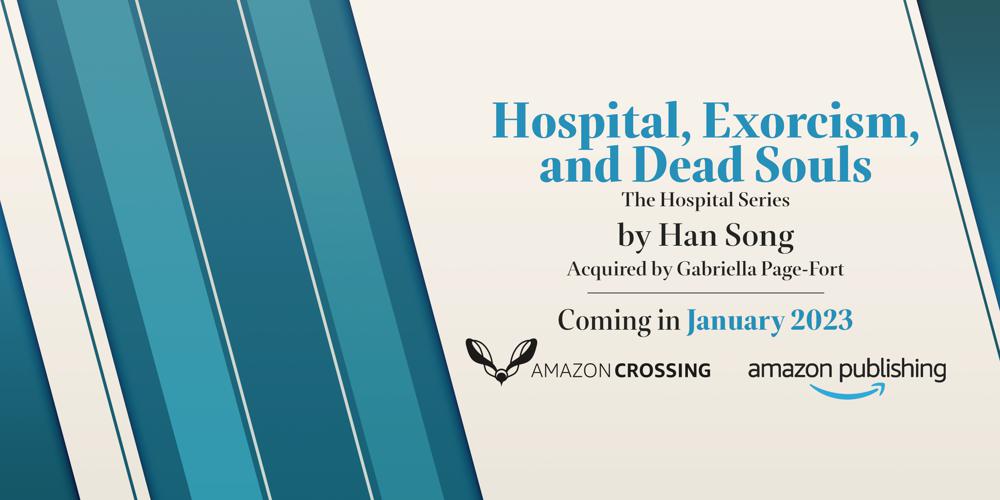
We were very excited to see this tweet promising an upcoming Han Song publication from Amazon Crossing. While the book is a ways out from publication yet, we thought it would be interesting to talk to Gabriella Page-Fort, Editorial Director of Amazon Crossing, who acquired the title, and ask her a few quick questions about how and why she picked it up. Now we’re looking forward to it even more!
Can you tell us a bit about how this book first came to you? What about its initial presentation first piqued your interest?
I've been looking for a book with Jennifer Lyons at the Jennifer Lyons Agency for years - we've enjoyed a long tradition of Absolute Bagels at her book-lined Upper West Side apartment - and when she reached out to me about HOSPITAL I knew instantly this was the one. I've been reading science fiction from around the world my whole career but I've only acquired a few books in the category - so many of my favorite submissions are simply "too weird" by American genre standards. But the world is changing before our very eyes. The huge US response to PARASITE put a lid on my fear of the weird and in fact I was actually seeking it out. And when Jennifer pitched me this series I happened to be going through some health problems so the hospital setting and extreme depiction of the health care system really spoke to me. What brings us together across differences better than the humiliating health care system mocking our mortality?
We've always felt that Han Song is in a category of his own when it comes to Chinese sci-fi. He's got some of the "hard sci-fi" aspects of writers like Liu Cixin, but also a lot of the immediate social commentary of the younger generation of "near future" authors of the genre. And, mixed in with that, a real darkness, or weirdness, of his own. How do you see him fitting in with other Chinese sci-fi available in English?
I'm a huge Liu Cixin fan, both of his work and his impact on American publishing as the first author in translation to win a Hugo Award. He's paved the way for English readers to engage with social commentary about contemporary China on an entertainment level - and proven to the industry that translations are welcomed by sci-fi readers. But as Han Song himself told me, their books are not direct "comps," as we would say in publishing. Han Song weaves in a stabilizing sense of normalcy that leaves me doubting nothing, making his universe wholly believable even as it contorts before my very eyes, leaping further from my lived experience with every page without ever losing that strong connection. You have to get deep into HOSPITAL (literally, deep under the earth where he descends into the labyrinth for care) before you start to wonder if there's something fishy going on here. So we're acclimating to this world in real time along with our protagonist, and we take the increasing alienation personally. I think Chinese sci-fi is a thing - readers will see social commentary as the connection between Liu Cixin and Han Song. Both are exquisitely subtle and truly funny, in an all-too-real-but-too-horrible-to-accept way.
Can you share something you like from the book: a particular scene, or a character, something that has stuck with you after reading?
The peacocks!! Their mysterious cage, their connection to Hinduism, the way they become a symbol of subversion and defiance for the medical-punks. From the moment we first spot the iron cage, the metaphor locks into place around us. "I stood there wondering if this hospital was closer to a zoo or a Buddhist temple." The novel is both, magnificently so, and I can't wait to continue the series and feel what life is like on Mars - it really can't feel weirder than the hospital!


Comments
There are no comments yet.